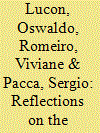|
|
|
Sort Order |
|
|
|
Items / Page
|
|
|
|
|
|
|
| Srl | Item |
| 1 |
ID:
092819


|
|
|
|
|
| Publication |
2009.
|
| Summary/Abstract |
This work models the carbon neutralization capacity of Brazil's ethanol program since 1975. In addition to biofuel, we also assessed the mitigation potential of other energy products, such as, bioelectricity, and CO2 emissions captured during fermentation of sugar cane's juice. Finally, we projected the neutralization capacity of sugar cane's bio-energy system over the next 32 years. The balance between several carbon stocks and flows was considered in the model, including the effects of land-use change. Our results show that the neutralization of the carbon released due to land-use change was attained only in 1992, and the maximum mitigation potential of the sugar cane sector was 128 tonnes of CO2 per ha in 2006. An ideal reconstitution of the deployment of the sugar cane sector, including the full exploitation of bio-electricity's potential, plus the capture of CO2 released during fermentation, shows that the neutralization of land-use change emissions would have been achieved in 1988, and its mitigation potential would have been 390 tCO2/ha. Finally, forecasts of the sector up to 2039 shows that the mitigation potential in 2039 corresponds to 836 tCO2/ha, which corresponds to 5.51 kg of CO2 per liter of ethanol produced, or 55% above the negative emission level.
|
|
|
|
|
|
|
|
|
|
|
|
|
|
|
|
| 2 |
ID:
125483


|
|
|
|
|
| Publication |
2013.
|
| Summary/Abstract |
This short communication presents a synthesis of a Working Group on Carbon Emission Policy and Regulation held at the University of Sao Paulo, in Brazil. The document looked at the problems with the international negotiations, the options for Brazil as it attempts to control emissions, and ways to leverage the mitigation process. Several options are currently being proposed, but these are neither clear in order to support a solid polycentric approach with adequate metrics, nor a robust international coordination and a sound scientific communication. Brazil has a central role in this process, for having successful initiatives on renewable energy and deforestation control. Its leadership can demonstrate how such policies might take shape. However, the country´s future is uncertain in terms of low carbon development. Although the country is still well positioned among BRICS to find practical solutions to the stalemate in international cooperation, several internal challenges need to be harmonized.
|
|
|
|
|
|
|
|
|
|
|
|
|
|
|
|
|
|
|
|
|